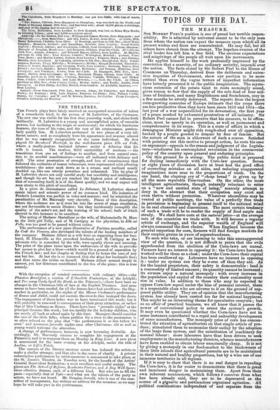THE THEATRES.
THE French plays have lately received an unexpected accession of talent of a remarkable kind, in the person of M. Laferriere, of the Gymnase. The new star was visible for the first time yesterday week, and shone forth brilliantly. M. Laferriere is a young and accomplished actor, of versatile powers, but inclining to the tragic or sentimental; for which his handsome features, the tone of his voice, and the cast of his countenance, particu- larly qualify him. M. Laferriere performed in two pieces of a very dif- ferent nature; and so completely were his appearance and manner altered that he was scarcely recognizable as the same individual. He first played Sir Bernhard Harleigh, , in the well-known piece Elk est Folk, where a madly-jealous husband labours under a delusion that his wife is insane. The restless, fitful excitability of madness — the transitions from one set of feelings to another, and from natural emo- tion to its morbid manifestations—were all indicated with delicacy and skill. The utter prostration of strength, and loss of consciousness that followed the outbursts of insane vehemence, were represented with affecting truthfulness: the actor sank down as in a swoon, and reclined nearly doubled up, like one utterly powerless and exhausted. The by-play of M. Laferriere shows not only careful study but sensibility and intelligence; and though his art has not yet reached the highest point of refinement, that of concealing itself, it is of the finest quality, and we may expect will soon attain to this pitch of excellence.
In a piece de ciroonstance called Le Debutant, M. Laferriere showed comic talent and mimetic power of no common kind. His imitation of Frederic Lemaitre was perfect in voice and manner; and he mimicked the peculiarities of Mr. Macready very cleverly. Pieces of this description, where the audience are as it were let into the secret of stage simulation, are not favourable to scenic illusion: but they incidentally exemplify the quality of the actor's art, and the training of his school; both of which showed in this instance to be excellent.
The acting of Madame Martelleur as the wife, of Mademoiselle St. Marc as the little girl Nelly, and of M. Cartigny as the physician, in Elle est Folk, was too good to be passed without notice..
The performance of a new piece illustrative of Parisian morality, called Le Code des Femmes, also developed the talents of the leading members of the company. Madame Albert as a wife bent on separating from her hus- band, M. Rhozeville as the provoked husband, and M. Cartigny as the advocate who is consulted by the wife, were equally clever and amusing. The point of the piece turns upon the endeavours of the wife to provoke her spouse to give her a blow—which would be a ground of separation by the French law; and her chagrin at finding that he boxes the ears of any one but her. At last she is so incensed that she slaps her husband's face; and thus turns the tables on herself. Madame Albert seemed deeply in earnest, yet her distresses contributed to the fun of the piece: this is true comedy.


























 Previous page
Previous page